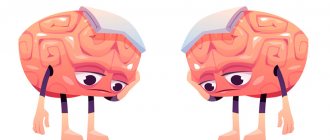A wide variety of psychiatric illnesses can manifest in childhood and adolescence. Their symptoms, although they have the most important signs that allow diagnosing the disorder, are still significantly different from the picture that is observed in adults.
In addition, there are conditions that are specific to childhood or adolescence. As they grow older, they may disappear altogether. But this does not mean that the emergence of childhood mental disorders can be ignored.
Personality disorders (in outdated terminology - psychopathy)
persistent, severe disturbances in the character and behavior of an individual, arising in childhood and adolescence and persisting into adulthood, accompanied by social and/or educational maladjustment. The reason for contacting a specialist for personality disorders, as a rule, is polymorphic anxious, depressive and asthenic reactions secondary to social and educational adaptation disorder.
According to the modern diagnostic manual DSM-V, personality disorders are divided according to the dominant type of characterological disorders into 3 main clusters - A, B, C.
Cluster A (paranoid, schizoid, schizotypal PD) is characterized by persistent character disorders with a predominance of introversion, emotional coldness, social isolation and/or originality of thinking, eccentricity (in some cases, distinct eccentricity) of behavior and hobbies.
Cluster B (borderline, hysterical, narcissistic) with a predominance of an acute thirst for recognition, demonstrativeness, emotional instability, irresponsibility and lack of volitional control of behavior (recklessness, infantility and self-centeredness of actions).
Cluster C (avoidant, dependent, obsessive-compulsive PD) is determined by persistent character disorders such as painful anxiety, shyness, incompetence, a tendency to avoid minimal difficulties in life with dependence on the control and care of relatives, and/or pathological perfectionism, regimentation with ease of fears and fears.
To make a diagnosis of personality disorders in clinical practice, the clinical criteria stated in modern diagnostic manuals (ICD, DSM) are used - in particular:
- Lack of adaptation is persistent, tough and sustainable
- Significant distress or impairment due to maladaptive behavior
- Relative stability and early onset of maladaptive behavioral patterns
While growing up, a child faces many challenges, including teenage stress. Stress is a common cause of mental illness among adolescents. If you do not provide the child with proper support during adolescence, then everything can end with a nervous disease at a more mature age, which is practically untreatable.
If parents notice drastic changes in a teenager’s behavior—he changed his hobbies, stopped being interested in things that had been dear to him for a long time—then this indicates some problems.
You shouldn’t immediately start pestering your child with questions about love, problems at school or with drugs; you need to get advice from a teenage psychologist. About how to identify a disorder by symptoms, how to help a child survive a difficult period.
Let's take a closer look at this.
Signs of mental disorders in teenagers
It is during adolescence that many mental illnesses begin to form, including schizophrenia and various types of psychoses.
Signs of such disorders include the following symptoms:
- the child has a new hobby to which he devotes all his time, but there is no success;
- abruptly abandoned old hobbies;
- began to do poorly at school when he had previously achieved significant success;
- I lost interest in everything I was previously passionate about.
But these symptoms do not 100% indicate mental disorders in adolescents. Perhaps this is how the accentuation of character manifests itself, which we will discuss in the following sections.
Symptoms
Symptoms of mental disorders in adolescents aged 12-18 years are manifested by the following features:
- sudden changes in mood, aggressiveness, conflicts with parents, teachers and other children, impulsiveness, melancholy, anxiety, inconsistency;
- disdainful attitude towards adults;
- excessive self-criticism or, on the contrary, excessive self-confidence;
- explosive reaction to outside advice and criticism;
- sensitivity is combined with callousness, the teenager is shy, but at the same time very irritated;
- refusal to obey generally accepted rules;
- schizoid;
- refusal of any guardianship.
If you notice only one of the points in your child’s behavior, then you don’t need to worry, just talk to him and find out the reason for the change.
Mental disorders in adolescents are indicated by a combination of several or all of the following symptoms.
Should I contact a specialist?
Parents usually prefer not to seek advice from a teenage psychologist. Some people think that it is a shame to take a child to a shrink, or that this will only worsen the situation, and the child will withdraw more into himself, lose trust in his parents, and so on.
In fact, it is necessary to contact a specialist.
Today, many psychologists work anonymously, that is, no one at school will know about a teenager’s visit to a doctor, and he may not even say his name.
To understand whether it is necessary to visit a psychologist in a particular case, answer a few questions:
- The above describes the signs of mental disorders in adolescents. Remember how dramatically the child has changed. If everything is fine in the family, there are no quarrels or sudden changes (divorce, death of a relative, etc.), and changes have become noticeable, then it is difficult to do without a psychologist. If the child smoothly switched to other interests or abruptly, but not everything is going smoothly in the family, then these symptoms may be an accentuation of character or an expression (involuntary) of internal experiences.
- Pay attention to your teen's sleep and appetite. If a child does not sleep well and refuses to eat, then it is worth visiting a specialist.
- If a child is in a long-term depressed state, he is not interested in anything, delusions and hallucinations appear, then urgently seek help from a professional.
Here I would like to note that many parents confuse melancholy in a teenager, which is typical for adolescence, with depression .
If, apart from this condition, nothing else bothers the child (he eats and sleeps as before, has not lost interest in his hobbies, and so on), then this is simply a difficult age threshold, which good parents themselves will help to overcome. Spend more time with your child, talk, but don’t “torture” him if he doesn’t like a topic, walk together, listen to him. During adolescence, even a simple hug will help.
If a teenager himself understands that something is wrong with him and tries to get rid of this condition and return life to its previous course, then this is a good sign. Most likely, he has a simple neurosis due to adolescence, study, relationships with the opposite sex, and the like.
If a serious mental illness is planned, then the teenager will perceive the new self calmly, and he will not have the desire to fix anything. There are specific disorders in the way of thinking of a teenager, but they are almost impossible to notice with an unprofessional eye.
To exclude or confirm a mental disorder in a teenager leading to a serious illness, it is still recommended to consult a psychologist.
If the specialist does not see any warning signs, then you can go home with peace of mind and a few tips from a professional. If alarming signals are detected, the doctor will help adjust the situation at home by talking with parents and other family members.
The specialist will also help the child learn to be in school and other public places with minimal psychological trauma.
We propose to consider the question of what mental disorders occur most often in adolescents.
Character accentuation and psychopathy
Only a professional psychologist who practices working with children and adolescents can understand what is happening to a teenager - character accentuation or psychopathy, since the line between the concepts is very thin.
During accentuation, some character traits begin to clearly sharpen, and by external signs this may resemble the picture of the development of psychopathy.
The first step is to make sure there is a normal social environment at home. As a rule, adolescents are less likely to suffer from psychopathy if their family is prosperous.
The diagnosis must be made carefully and can only be reported to the teenager’s parents and teachers. At the same time, the psychologist must explain to the parties the difference between character accentuation and psychopathy, so as not to accidentally label the teenager as “psycho.”
Melancholy
When a teenager begins to experience hormonal changes, he changes his behavior. A melancholic state is the norm of adolescence, and should not be confused with depression.
The first signs of melancholy may be a teenager’s complaints about a restless state of mind. He withdraws into himself against this background. There may also be attacks of aggression, including those directed at oneself.
Young people in this state are often disappointed in themselves. At such moments, a teenager should not be left alone. The world loses color for him, it seems empty and worthless, in this state many think about suicide, and some even attempt to commit suicide. The teenager thinks that no one needs him.
Signs of melancholy
If you notice at least half of the listed signs of melancholy, then immediately contact a specialist.
Symptoms include the following changes:
- vulnerability, tears even out of nowhere;
- mood changes for no reason;
- self-isolation, closure;
- frequent attacks of aggression over trifles;
- insomnia;
- excessive appetite or lack thereof;
- decline in school performance;
- constant fatigue, malaise.
Affective insanity
The picture of the development of such a mental disorder in a teenager is very similar to melancholy, but is no longer the norm during adolescence.
The main danger of the disorder is a crime of law against the background of depression, and also not an attempt at suicide, but its real possibility.
It is not easy to distinguish melancholy from manic-depressive psychosis.
Please note that in the first case, the teenager’s mood often changes, and in the second, he remains in a manic mood for some time, that is, he is passionate about something, cheerful, full of energy and plans, and separation from activities leads to aggression.
A manic mood often changes to a depressive one - the collapse of all hopes, bad memories, dissatisfaction with life and oneself. It is very difficult to pull a teenager out of such a state.
If you notice such symptoms in your child, then immediately take him to a specialist.
Schizophrenia
This disorder is very similar to manic-depressive psychosis. All the symptoms coincide - at first the mood is manic, enthusiastic, and then prolonged depression begins. There is a difference, and it is the main thing - with schizophrenia, panic attacks, delirium, and hallucinations are possible.
Summarize
Problems in adolescence are an integral part of growing up.
If you see that something is going on with your child, do not ignore it, thinking that adolescence will pass on its own.
If you do not help a teenager during this difficult time for him, the consequences can be very dire: from the development of a serious mental illness to the child’s suicide.
Source
WHO. Mental disorders in children and adolescents
WHO. Suicide prevention. Reference Guides
Where to turn for help when you urgently need to talk, but it’s difficult to get to a psychologist or dial a helpline number.
Here is a selection of free services that provide online help and are staffed by specialists and trained volunteers. These are resources where you are not afraid to talk about difficulties.
Internet service for emergency psychological assistance of the Ministry of Emergency Situations of Russia
Who created: Ministry of Emergency Situations of the Russian Federation.
A free psychological assistance service where you can get a one-time consultation or register and create a personal account to communicate with a personal consultant. Psychodiagnostic testing is carried out in your personal account; the consultant recommends exercises to cope with the problem. Plus, the site has a section with articles from service consultants.
Hotline phone number: 8-499-216-50-50.
Ask for help
Help is at hand
Who created: the organization “Doctors for Children”, which supports families and protects the rights of children.
Supporting teenagers and children in difficult situations. The project website has two sections: for children from 6 to 12 years old and for teenagers. They are slightly different, but the main thing is the ability to get advice from a psychologist via chat, write a letter and find phone numbers to call. The chat is open from 11:00 to 23:00 Moscow time.
The project has a group on the VKontakte social network.
Ask for help
Your territory
Who created: the “Your Territory” foundation, which specializes in protecting children’s rights.
Another online help service for teenagers, where you can talk about everything that worries them during adolescence.
The consultant works from 15:00 to 3:00 - just after school ends, and at a time when unnecessary thoughts enter your head.
The project also has a group on the VKontakte social network.
Ask for help
Psychological assistance service
Who created: the state budgetary institution “Moscow Service for Psychological Assistance to the Population.”
Remote counseling is provided not only for Moscow residents. Consultations are conducted online (upon prior request), by email, and in the psychological support forum.
Ask for help
Helpline
Who created: Fund to support children in difficult life situations.
Both adults and children can ask questions on the site. If you don’t have the strength to call, leave a message to the online consultant, and the answer will be sent by email.
A single all-Russian helpline for children, teenagers and their parents: 8-800-2000-122.
Ask for help
I'm a parent
Who created: Fund to support children in difficult life situations.
Online consultations on parenting and difficult situations in relationships with children. Questions are published on the website, but consultations are anonymous.
Ask for help
Read also:
- Consultation with a specialist. Prevention of mental disorders
- Mental health. How to improve
- Teenage drug addiction and causes of drug addiction
- On the activities of Rospotrebnadzor to prevent suicide among children and adolescents
- WHO. Suicides can be prevented
Psychosomatic disorders (somatoform/somatized and hypochondriacal disorders)
They include a wide range of mental pathologies that mimic somatic diseases (cardiopathologies, gastrointestinal disorders, vegetative-vascular dystonia, prolonged fever to subfebrile levels, urticaria, etc.), and are accompanied by persistent anxiety about one’s own health and a belief in organic the nature of suffering.
A distinctive feature is persistent, long-lasting and painful painful bodily sensations, localized in a specific system of the body, which do not reveal real somatic disorders according to functional diagnostics.
Regardless of the specifics of bodily sensations, the essence of psychosomatic disorders lies in the form of a neurotic hypochondriacal reaction with fixation on one’s own illness, disproportionate intensity of perception of pain phenomena, limiting one’s life to “behavior in illness” (systematic appeal to doctors; distrust of test data that refute the presence of an alleged disease, refusal of educational and/or daily activities).
Classic variants of somatoform disorders of adolescence include: irritable bowel syndrome, psychogenic flatulence, bladder neurosis, thermoneurosis, cranialgia (tension headaches), pseudo-allergies, neurogenic psoriasis.
Treatment of psychological disorders in adolescents
When a mental disorder and symptoms are recognized in adolescents , treatment is essential. It can be outpatient or inpatient. Under the round-the-clock supervision of doctors and psychologists at the rehabilitation center, you can provide comprehensive comprehensive assistance, monitor medication intake, conduct relaxation procedures, and various courses of therapy.
You don't have to worry about your children by entrusting them to us. Treatment is strictly confidential, structured and individualized. We also provide paid services for calling a doctor to your home and compulsory treatment. We will make every effort to rid children of mental disorders as quickly and gently as possible.
Affective pathology
The most common type of affective pathology in adolescence includes depressive disorders. The urgent need for early diagnosis and specialized treatment is determined by the high suicidal risk of this group of patients.
In modern clinical practice, depressive disorder is defined as a chronic state of depressed mood, accompanied by decreased vitality, apathy, fatigue, sleep and appetite disorders.
Depression, melancholy with a feeling of heaviness in the chest, apathy and anxiety come to the fore in the mental status of patients. The specificity of the mood decrease option is determined by the clinical form of the depressive disorder (anxious, apathetic, melancholy, etc. depression). Patients lose their former liveliness, become tired, vulnerable and susceptible to minimal emotional provocateurs - their educational productivity decreases, previously uncharacteristic tearfulness, isolation, and a tendency to painful self-flagellation and the formation of ideas of their own insolvency and low value appear. Sleep disorders such as insomnia and difficulty waking up are noted. Appetite decreases, or, in the case of anxious depression, changes to the type of compulsive overeating.
It is necessary to take into account the fact that depression is officially recognized as a mental illness, the etiology of which is neurotransmitter disorders, and therefore requires timely drug treatment. Psychotherapeutic correction in the treatment of depressive disorders acts as a significant, but mostly auxiliary tool, and cannot be an equivalent substitute for psychopharmacotherapy. Ignoring the need to take specialized medications is fraught with an increase in the severity of depressive symptoms and an increase in suicidal risk.
Why are children susceptible to mental disorders?
Multiple causes contribute to the development of mental disorders in children. Psychiatrists identify whole groups of factors:
- genetic;
- biological;
- sociopsychological;
- psychological.
The most important provoking factor is a genetic predisposition to mental disorders. Other reasons include:
- problems with intelligence (mental retardation and others like it);
- organic brain damage;
- incompatibility of the temperament of the baby and the parent;
- family discord;
- conflicts between parents;
- events that left psychological trauma;
- medications that can cause a psychotic state;
- high fever, which may cause hallucinations or delusions;
- neuroinfections.
To date, all possible causes have not been fully studied, but studies have confirmed that children with schizophrenia almost always have signs of organic brain disorders, and patients with autism are often diagnosed with cerebral insufficiency, which is explained by hereditary causes or injuries during childbirth .
Psychosis in young children can occur due to parental divorce.
At-risk groups
Thus, children are at risk:
- one of whose parents had or has mental disorders;
- who are brought up in a family where conflicts constantly arise between parents;
- have had neuroinfections;
- those who have suffered psychological trauma;
- whose blood relatives have mental illnesses, and the closer the degree of relationship, the greater the risk of developing the disease.
Behavioral disorders
adolescence are characterized by particular variability and polymorphism of manifestations. The most common variant of PD, especially maladaptive for adolescents at the social and educational level, is the so-called heboid syndrome, characterized by a painful sharpening and distortion of the emotional-volitional characteristics of the personality characteristic of puberty (pathological pubertal crisis).
The clinical picture of heboid syndrome is determined by gross behavioral disorders that do not correspond to the innate character of a teenager, with the appearance of rudeness, hostility, intolerance, a tendency to asocial and antisocial behavior, pronounced disinhibition and perversion of primitive drives (sexual liberation, alcoholism, drug addiction, etc.), loss or weakening of the highest moral principles (loss of taboos, social distance, distortion of the understanding of the boundaries of good and evil).
Heboid syndrome primarily occurs in the initial or manifest periods of schizophrenia and schizophrenia spectrum disorder, as a result of which it requires mandatory observation and treatment by a psychiatrist.
Borderline psychopathology
To begin, I would like to talk about borderline psychopathology, which often does not require any active psychiatric treatment, any drug intervention, or hospitalization.
In this case we are talking about behavioral disorders
, when those very violent emotions in behavior, when that very opportunism turns a person into a prickly creature, categorically refusing to discuss any issues peacefully, acting as a war against everyone.
In such situations, we talk about personality disorders, and this is a diagnostic category that exists in the classification of diseases. However, we still do not consider it a disease, since it is a character condition.
Character is not a disease
, character is what is given to a person by nature from birth. This is something that is being formed one way or another. And this is precisely the final phase of character formation, the very puberty age that we are talking about now. And this pubertal age, which lasts from approximately 11 to 17 years, is the determining age in the final formation of character traits.
After 17 years, the character that has been formed will remain unchanged, and all its pros and cons, positive and negative, strengths and weaknesses, as formed by this time, will remain so until the end of life.
I’m talking about this specifically in order to focus the attention of loved ones, relatives and, above all, parents on the significance of every psychological nuance associated with upbringing, or nuance associated with the attitude towards the problems of a teenager in his future life.
What seems unimportant, insignificant or insignificant to us adults, or what seems to us to be a rather successful pedagogical move, for a teenager can turn out to be an event with fatal consequences.
Facts about puberty
Puberty is a period of physiological changes characterized by the body's preparation to perform reproductive functions.
In a broader sense, puberty can be called growing up, since it is during this period that the foundation of a person’s personality is laid. The processes of physiological and psychological changes occur in parallel due to the influence of hormones and the teenager’s reaction to his own condition. On average, puberty can begin at 11-13 years of age and end at 18-19 years of age. Girls usually start puberty earlier. The main regulators of physiological changes are the gonads - the ovaries in women and the testes in men. These organs release hormones into the blood that control the development of the musculoskeletal system, genital organs and other anatomical structures. The influence of hormones on the central nervous system is due to changes in the balance of neurotransmitters. In men, puberty is the only period of psychological instability in life caused by endocrine changes, while in women similar phenomena occur during pregnancy.
Aspects of the psychological characteristics of puberty may depend on the following factors
- Heredity. Traits transmitted from parents affect the development of the nervous system.
- Nutrition. During puberty, the body requires large amounts of proteins, carbohydrates, vitamins and minerals for the development of organs, including the brain.
- Social influences, including relationships with peers and parents.
During puberty, drastic changes in physique occur. Boys and girls notice disproportionate body development, such as long limbs, a stooped posture, and a large head. All these temporary features affect a person’s self-esteem. At the same time, the hormonal background only enhances the influence of reflection on the psyche. For some adolescents, these factors lead to the development of persistent personality traits such as anxiety and avoidant behavior. In this regard, it is important to start working with a psychologist as early as possible.










